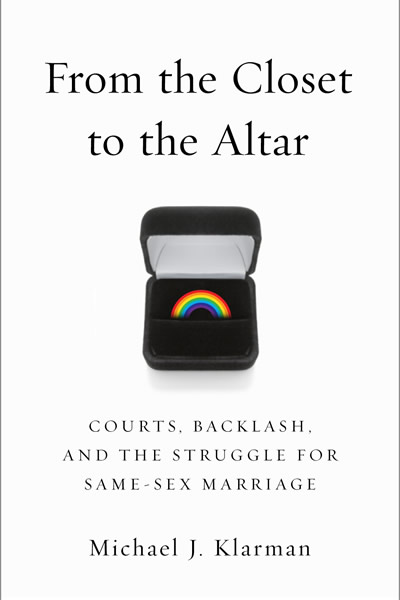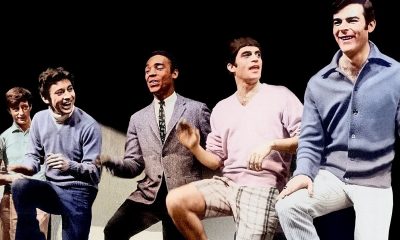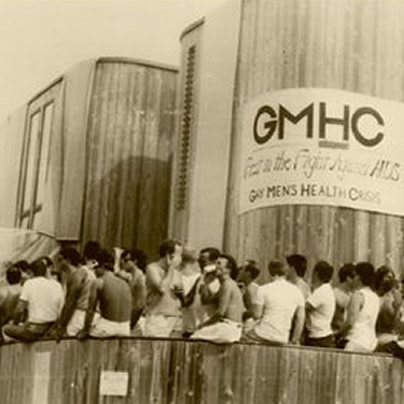Arts & Entertainment
Road to marriage
Well-researched new book relays gay U.S. advances

‘From the Closet to the Altar: Courts, Backlash, and the Struggle for Same-Sex Marriage’
By Michael J. Klarman
Oxford University Press
$27.95
276 pages
It’s said that nothing worthwhile comes easily and that’s certainly the case with the twisted, winding road that we’re still on with same-sex marriage laws in the U.S.
In the new book “From the Closet to the Altar” by Michael J. Klarman, you’ll see why and how the advances and lost ground have occurred.
In the years after World War II, gay rights faced “daunting hurdles.”
Organized activism was rare then because homosexuality was basically illegal in every state. Homosexuals and those merely suspected of homosexuality were subject to police raids, surveillance, loss of jobs and worse. They were believed to be “possibly as dangerous as communists.”
By the early-to-mid 1960s, however, social mores had relaxed enough for major news outlets to gingerly cover homosexuality in their pages. The change, Klarman writes, was in part because the Supreme Court deregulated pornography, which opened the door for gay literature. By this time, gay rights organizations were also plentiful and more vocal.
Same-sex marriage at that time, however, was largely a non-issue. Monogamy was practiced, but family life was often sneered at by activists.
Still, the possibility of marriage was pretty enticing.
In Minnesota in 1971, two men were married in a church, though the state refused to recognize their marriage as valid. In 1975, two men in Phoenix applied for a marriage license; a local court voided the marriage. That same year, couples in Colorado found a “more obliging” court clerk and several were married before the state stopped her from issuing more licenses.
By 1980, Ronald Reagan was elected, the Moral Majority reigned and public sentiment was definitely against same-sex marriage. Still, anti-discrimination laws were widely passed across the nation, giving proponents hope, but then AIDS took the focus off the issue.
And then came Bill Clinton.
Author Michael J. Klarman begins his book by discussing how the Supreme Court has often followed social convention. That made me afraid I was getting myself into something dryly emotionless. I’m happy to say I was wrong.
“From the Closet to the Altar” is an interesting, lively look at the history of gay rights as well as that of same-sex marriage. Klarman sets the tone for every history-making milestone by explaining how it’s connected to the event that came before it, which makes it easy to understand how we got where we are now. In between, he makes some excellent, valid points as he looks at the future of the institution, including how and why it’s just a matter of time before there’s nation-wide acceptance.
Starry-eyed dreamers won’t find romance here, but historians and realists will love the facts that “From the Closet to the Altar” presents.

Team DC, the umbrella organization for LGBTQ-friendly sports teams and leagues in the D.C. area, held its annual Night of Champions Awards Gala on Saturday, April 20 at the Hilton National Mall. The organization gave out scholarships to area LGBTQ student athletes as well as awards to the Different Drummers, Kelly Laczko of Duplex Diner, Stacy Smith of the Edmund Burke School, Bryan Frank of Triout, JC Adams of DCG Basketball and the DC Gay Flag Football League.
(Washington Blade photos by Michael Key)




















The 2024 National Cannabis Festival was held at the Fields at RFK Stadium on April 19-20.
(Washington Blade photos by Michael Key)
















Covering the @NatlCannaFest at RFK Stadium for @WashBlade . Stop by the LGBTQ+ booth and pick up a paper if you are here. pic.twitter.com/is7hnsaPns
— Michael Patrick Key (@MichaelKeyWB) April 20, 2024
Theater
‘Amm(i)gone’ explores family, queerness, and faith
A ‘fully autobiographical’ work from out artist Adil Mansoor

‘Amm(i)gone’
Thorough May 12
Woolly Mammoth Theatre
641 D St., N.W.
$60-$70
Woollymammoth.net
“Fully and utterly autobiographical.” That’s how Adil Mansoor describes “Amm(i)gone,” his one-man work currently playing at Woolly Mammoth Theatre.
Both created and performed by out artist Mansoor, it’s his story about inviting his Pakistani mother to translate Sophocles’s Greek tragedy “Antigone” into Urdu. Throughout the journey, there’s an exploration of family, queerness, and faith,as well as references to teachings from the Quran, and audio conversations with his Muslim mother.
Mansoor, 38, grew up in the suburbs of Chicago and is now based in Pittsburgh where he’s a busy theater maker. He’s also the founding member of Pittsburgh’s Hatch Arts Collective and the former artistic director of Dreams of Hope, an LGBTQ youth arts organization.
WASHINGTON BLADE: What spurred you to create “Amm(i)gone”?
ADIL MANSOOR: I was reading a translation of “Antigone” a few years back and found myself emotionally overwhelmed. A Theban princess buries her brother knowing it will cost her, her own life. It’s about a person for whom all aspirations are in the afterlife. And what does that do to the living when all of your hopes and dreams have to be reserved for the afterlife?
I found grant funding to pay my mom to do the translation. I wanted to engage in learning. I wanted to share theater but especially this ancient tragedy. My mother appreciated the characters were struggling between loving one another and their beliefs.
BLADE: Are you more director than actor?
MANSOOR: I’m primarily a director with an MFA in directing from Carnegie Mellon. I wrote, directed, and performed in this show, and had been working on it for four years. I’ve done different versions including Zoom. Woolly’s is a new production with the same team who’ve been involved since the beginning.
I love solo performance. I’ve produced and now teach solo performance and believe in its power. And I definitely lean toward “performance” and I haven’t “acted” since I was in college. I feel good on stage. I was a tour guide and do a lot of public speaking. I enjoy the attention.
BLADE: Describe your mom.
MANSOOR: My mom is a wonderfully devout Muslim, single mother, social worker who discovered my queerness on Google. And she prays for me.
She and I are similar, the way we look at things, the way we laugh. But different too. And those are among the questions I ask in this show. Our relationship is both beautiful and complicated.
BLADE: So, you weren’t exactly hiding your sexuality?
MANSOOR: In my mid-20s, I took time to talk with friends about our being queer with relation to our careers. My sexuality is essential to the work. As the artistic director at Dreams of Hope, part of the work was to model what it means to be public. If I’m in a room with queer and trans teenagers, part of what I’m doing is modeling queer adulthood. The way they see me in the world is part of what I’m putting out there. And I want that to be expansive and full.
So much of my work involves fundraising and being a face in schools. Being out is about making safe space for queer young folks.
BLADE: Have you encountered much Islamophobia?
MANSOOR: When 9/11 happened, I was a sophomore in high school, so yes. I faced a lot then and now. I’ve been egged on the street in the last four months. I see it in the classroom. It shows up in all sorts of ways.
BLADE: What prompted you to lead your creative life in Pittsburgh?
MANSOOR: I’ve been here for 14 years. I breathe with ease in Pittsburgh. The hills and the valleys and the rust of the city do something to me. It’s beautiful, it’ affordable, and there is support for local artists. There’s a lot of opportunity.
Still, the plan was to move to New York in September of 2020 but that was cancelled. Then the pandemic showed me that I could live in Pittsburgh and still have a nationally viable career.
BLADE: What are you trying to achieve with “Amm(i)gone”?
MANSOOR: What I’m sharing in the show is so very specific but I hear people from other backgrounds say I totally see my mom in that. My partner is Catholic and we share so much in relation to this.
I hope the work is embracing the fullness of queerness and how means so many things. And I hope the show makes audiences want to call their parents or squeeze their partners.


















